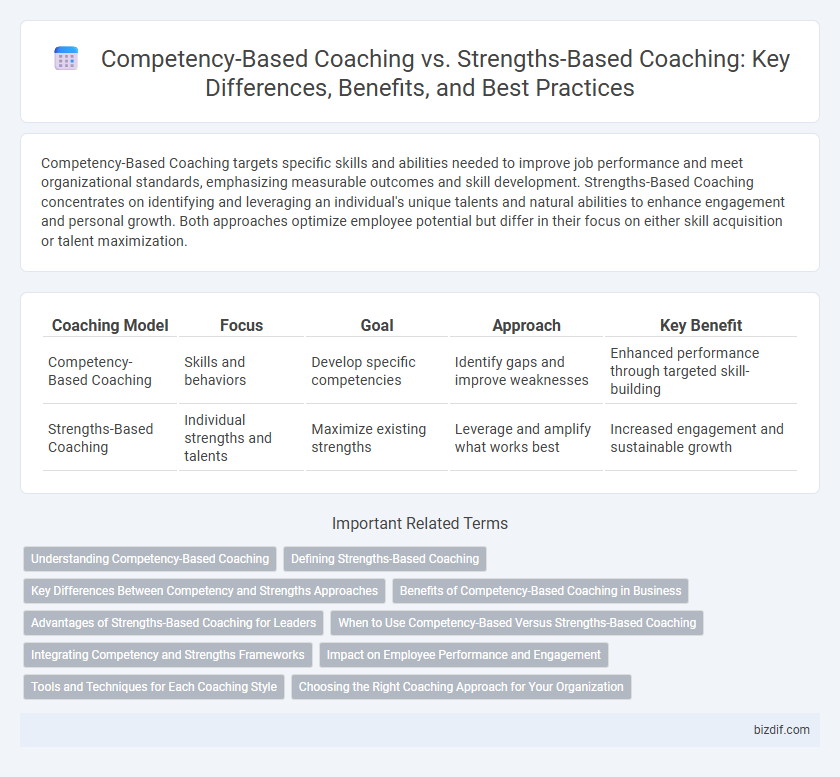Competency-Based Coaching targets specific skills and abilities needed to improve job performance and meet organizational standards, emphasizing measurable outcomes and skill development. Strengths-Based Coaching concentrates on identifying and leveraging an individual's unique talents and natural abilities to enhance engagement and personal growth. Both approaches optimize employee potential but differ in their focus on either skill acquisition or talent maximization.
Table of Comparison
| Coaching Model | Focus | Goal | Approach | Key Benefit |
|---|---|---|---|---|
| Competency-Based Coaching | Skills and behaviors | Develop specific competencies | Identify gaps and improve weaknesses | Enhanced performance through targeted skill-building |
| Strengths-Based Coaching | Individual strengths and talents | Maximize existing strengths | Leverage and amplify what works best | Increased engagement and sustainable growth |
Understanding Competency-Based Coaching
Competency-Based Coaching emphasizes identifying and developing specific skills and behaviors essential for job performance and career advancement. It involves setting clear benchmarks based on industry standards and measurable outcomes, ensuring targeted improvement in areas like communication, leadership, and technical expertise. This approach provides a structured framework for assessing progress and aligning coaching interventions with organizational goals.
Defining Strengths-Based Coaching
Strengths-Based Coaching centers on identifying and leveraging an individual's inherent talents and abilities to maximize performance and personal growth. This coaching approach emphasizes building on existing strengths rather than concentrating on weaknesses, fostering increased motivation and engagement. By aligning goals with core competencies, Strengths-Based Coaching enhances resilience, productivity, and overall satisfaction in professional and personal development.
Key Differences Between Competency and Strengths Approaches
Competency-Based Coaching targets the development of specific skills and behaviors essential for job performance, emphasizing measurable progress and standard benchmarks. Strengths-Based Coaching focuses on identifying and leveraging individual talents to maximize potential and engagement, promoting natural abilities rather than fixing weaknesses. The key difference lies in competencies being externally defined capabilities required for success, while strengths are internal qualities that drive personal fulfillment and peak performance.
Benefits of Competency-Based Coaching in Business
Competency-based coaching enhances employee performance by targeting specific skills and behaviors essential for business success, leading to improved productivity and goal alignment. It offers measurable development outcomes, enabling organizations to track progress and identify areas for continuous improvement. This structured approach fosters a culture of accountability and skill mastery, driving sustainable growth and competitive advantage.
Advantages of Strengths-Based Coaching for Leaders
Strengths-Based Coaching enhances leadership effectiveness by focusing on cultivating inherent talents, which boosts confidence and engagement. This approach promotes sustainable development by leveraging natural abilities, resulting in improved decision-making and team motivation. Leaders employing Strengths-Based Coaching experience increased productivity and stronger workplace relationships due to personalized growth strategies.
When to Use Competency-Based Versus Strengths-Based Coaching
Competency-based coaching is most effective when developing specific skills or addressing performance gaps essential to a role, making it ideal for structured environments requiring measurable outcomes. Strengths-based coaching excels in enhancing employee engagement and leveraging inherent talents to maximize productivity and innovation. Choosing between these approaches depends on whether the goal is to build critical competencies or to amplify natural strengths for sustained professional growth.
Integrating Competency and Strengths Frameworks
Integrating competency-based coaching and strengths-based coaching frameworks enhances personalized development by aligning skill mastery with individual talents. This approach leverages competency models to identify essential abilities while capitalizing on personal strengths to boost performance and engagement. Organizations adopting integrated frameworks report improved employee growth, higher retention rates, and accelerated achievement of strategic goals.
Impact on Employee Performance and Engagement
Competency-Based Coaching enhances employee performance by focusing on identifying and improving specific skills and behaviors linked to job success, leading to measurable growth in capabilities and productivity. Strengths-Based Coaching boosts engagement by emphasizing employees' inherent talents, fostering motivation, confidence, and job satisfaction, which drives sustained performance improvements. Combining both approaches delivers a balanced impact, aligning skill development with personal strengths to maximize overall employee effectiveness and commitment.
Tools and Techniques for Each Coaching Style
Competency-Based Coaching employs tools such as skill assessments, performance metrics, and behavioral frameworks like the STAR technique to identify gaps and develop targeted action plans, enhancing specific professional abilities. Strengths-Based Coaching utilizes techniques including strengths assessments like the CliftonStrengths, narrative coaching, and positive psychology exercises to amplify innate talents and foster intrinsic motivation. Both styles integrate feedback mechanisms but differ fundamentally in their focus--competency coaching targets improvement areas, while strengths coaching builds on existing capabilities.
Choosing the Right Coaching Approach for Your Organization
Competency-Based Coaching emphasizes developing specific skills and behaviors aligned with organizational goals, providing measurable outcomes and targeted growth for employees. Strengths-Based Coaching focuses on identifying and amplifying individual talents to enhance performance and engagement by leveraging innate abilities. Selecting the right coaching approach depends on your organization's objectives, culture, and whether you prioritize skill development or maximizing existing strengths for sustainable success.
Competency-Based Coaching vs Strengths-Based Coaching Infographic

 bizdif.com
bizdif.com